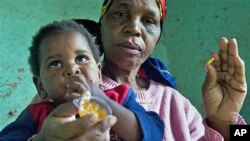Delegates from 15 African countries have concluded a workshop in Kenya's capital to discuss how to stop mother-to-child transmission of HIV. They agreed to support new and existing programs that would see this goal being accomplished by 2015.
World Health Organization Family and Reproductive Health Director Tigest Ketsela said more than 85 percent of children in the world living with HIV/AIDS are located in sub-Saharan Africa, primarily because of mother-to-child transmission.
She said health-care systems in many African countries are so weak that even if medical facilities are there, HIV-positive women and their children fall through the cracks.
"It is not only enough to have health facilities, health services, but do we have the appropriate human resources, do we have the right kind of medications and so on," said Ketsela. "The other issue is with health-information systems. Again, we do not have information as to how many people come, how many are we targeting, how many get the services, and where are we going wrong?"
Most of the three-day meeting looked at how countries are falling short of preventing HIV-positive pregnant women from passing the virus onto their babies.
For example, in many places, health-care systems are not implementing WHO guidelines that outline the proper use of anti-retroviral therapies for pregnant and breast-feeding women, and for infants exposed to HIV. In addition, counseling services for HIV-positive mothers may be missing or the counselors not properly trained, and there may not be enough anti-retroviral drugs to go around.
UNAIDS Senior HIV Prevention Advisor Helen Jackson said another prevention strategy is often overlooked.
"At the moment the emphasis is much more on identifying women with HIV who are pregnant and who need anti-retroviral treatment to protect their babies. If we can avoid the unintended pregnancies amongst HIV-positive women, then far fewer (HIV) positive women will be becoming pregnant. There is a huge number of unintended pregnancies at the moment," said Jackson.
She said strategies to prevent pregnant women from becoming HIV positive during their pregnancies also are inadequate.
Workshop delegates urged governments to implement Prevention of Mother-to-Child Transmission programs that have been tested on a small-scale. These include: making AIDS drugs and Prevention of Mother-to-Child Transmission services widely available at the village level, levying a tax on airline travel to fund those programs, and implementing the new WHO guidelines for drug therapies.
They also agreed to support existing plans to prevent mother-to-child HIV transmission, on reaching isolated and rural populations, strengthening health services for mothers and children, and improving services, drugs and the use of infant prophylaxis.
Delegates say in all countries, Prevention of Mother-to-Child Transmission Programs should be included in routine antenatal and reproductive health services, as well as child-health services.
They urged all pregnant women and their partners to be tested and counseled for HIV during the first antenatal care visit.
UNAIDS has called for the virtual elimination of mother-to-child transmission of HIV by 2015.
African Conference Calls for Strengthening Mother-to-Child HIV Programs











